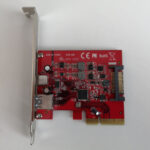My studio PC is an i7-6700, which is fast enough for audio work but a bit underpowered for video editing. For a potential upgrade I’d like to consider something AMD Ryzen based.
Going AMD means I’d have to give up on my upgrade to Thunderbolt, but that’s only a nice-to-have so I can live with it. But even sticking with USB there’s a risk. Audio gear can be timing sensitive, and manufacturers often assume Intel chipsets, and some devices are official Intel USB only.
I can’t test a motherboard I haven’t bought, but I can test PCIe USB cards. If I have a good one, worst case scenario is I have to give up a PCIe slot in the new PC.
Intel B150 USB 2 & USB 3
This is my perfectly good on-board USB. I tend to use the USB 2 port rather than USB 3, as the 1248 is only USB 2 and anecdotally USB 3 chipsets have had more issues with audio gear in general. For this, I’ll test both.
StarTech PEXUSB311A1C

This card I already owned and it normally lives in another PC. It’s based around the ASMedia ASM1142 and is a 10Gbps USB 3.1 card. Annoyingly as it’s a PCI x4 card I hard to remove my graphics card for the test, but it’s not StarTech’s fault I have a cheap motherboard.
Innateck Superspeed 4 Ports

I chose this one as it’s the currently recommended USB card for Oculus Rift devices. The chipset is a FL1100EX by Fresco Logic who I’d never heard of before. This is USB 3.0 5Gbps card.
This card unfortunately didn’t work at all. It wasn’t recognised by either of my PCs and it’s going back to Amazon.
Testing
I used a Beechmast recording for testing as it’s a big, complicated mix. Initially I set the 1248 to minimum buffers (Host buffer size = 16, Safety offset = 16).
For playback none of the interfaces were 100% stable and I got break-ups with all them. This setting seemed very dependent on how busy the PC was elsewhere. For example, if I opened Facebook and scrolled up and down the audio would break-up. Of the three, the Intel USB 2 seemed slightly better than the others.
Interestingly, recording was stable even when playback wasn’t. So when I recorded an additional track whilst playing back and triggered the audio breakup the extra recorded track would not have audible faults. This is really positive.
At any higher buffer setting all three seemed stable.
Conclusions
I have some complaints about the 1248, but the USB implementation is really solid. The fact that it can anything close to stable at 16/16 buffers (1.6ms round trip) with that project is impressive. And even when there were break-ups it didn’t affect recording which is the most important thing.
And the 1248 did this not just with Intel USB but with ASMedia USB as well. It would have been nice to have another card to test, but for my own use it means I can always move this card to a future new PC if needed.